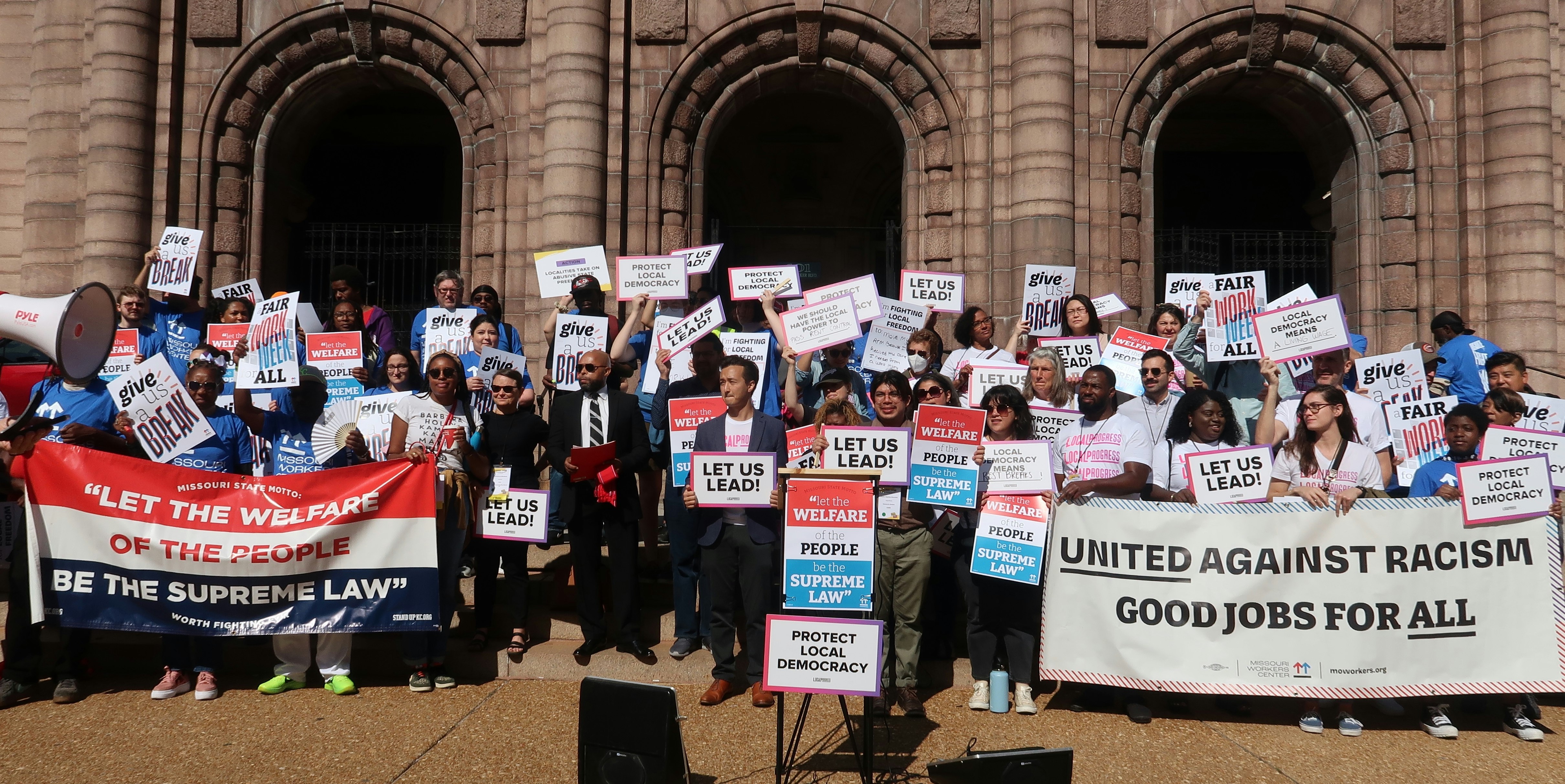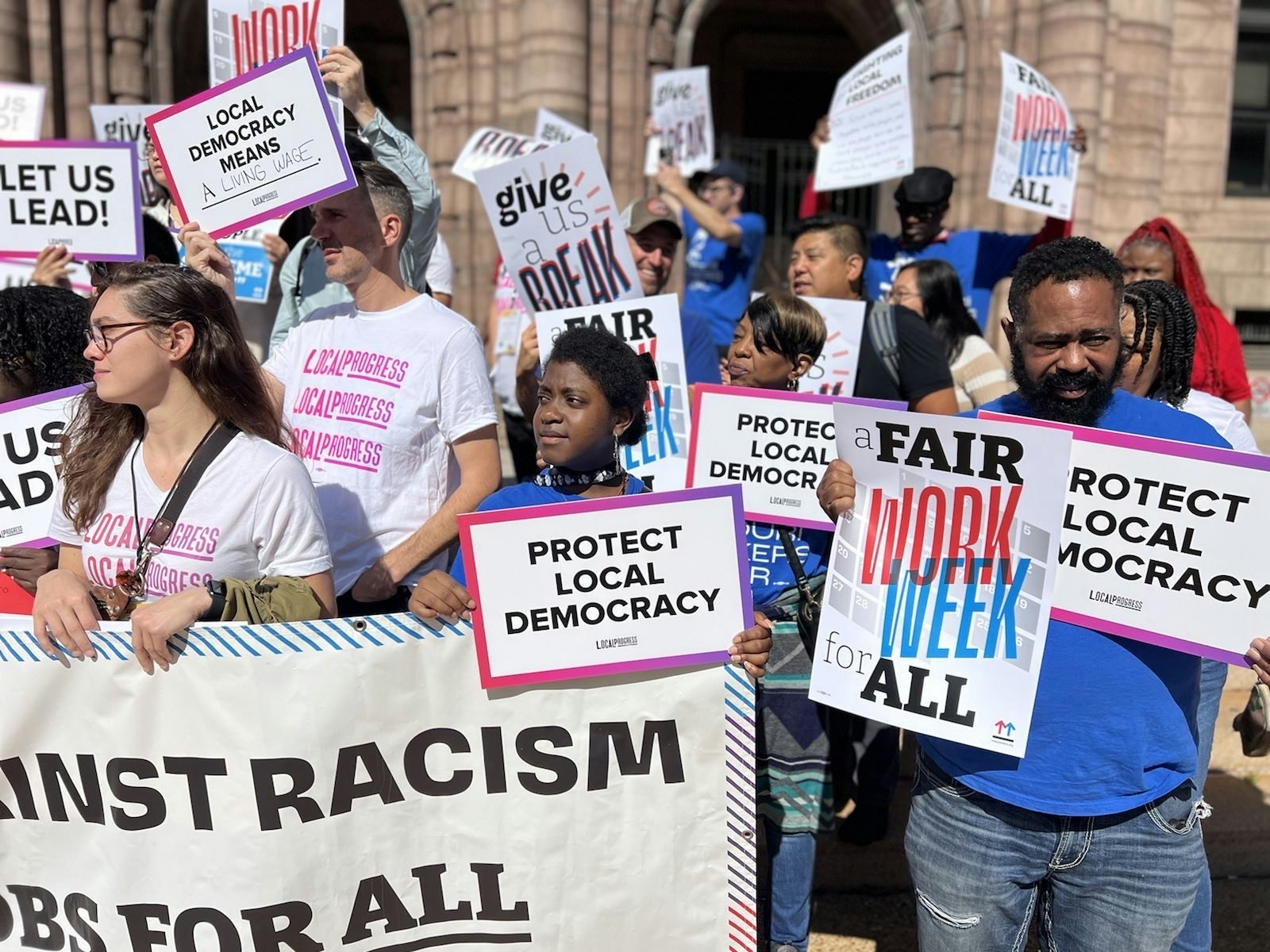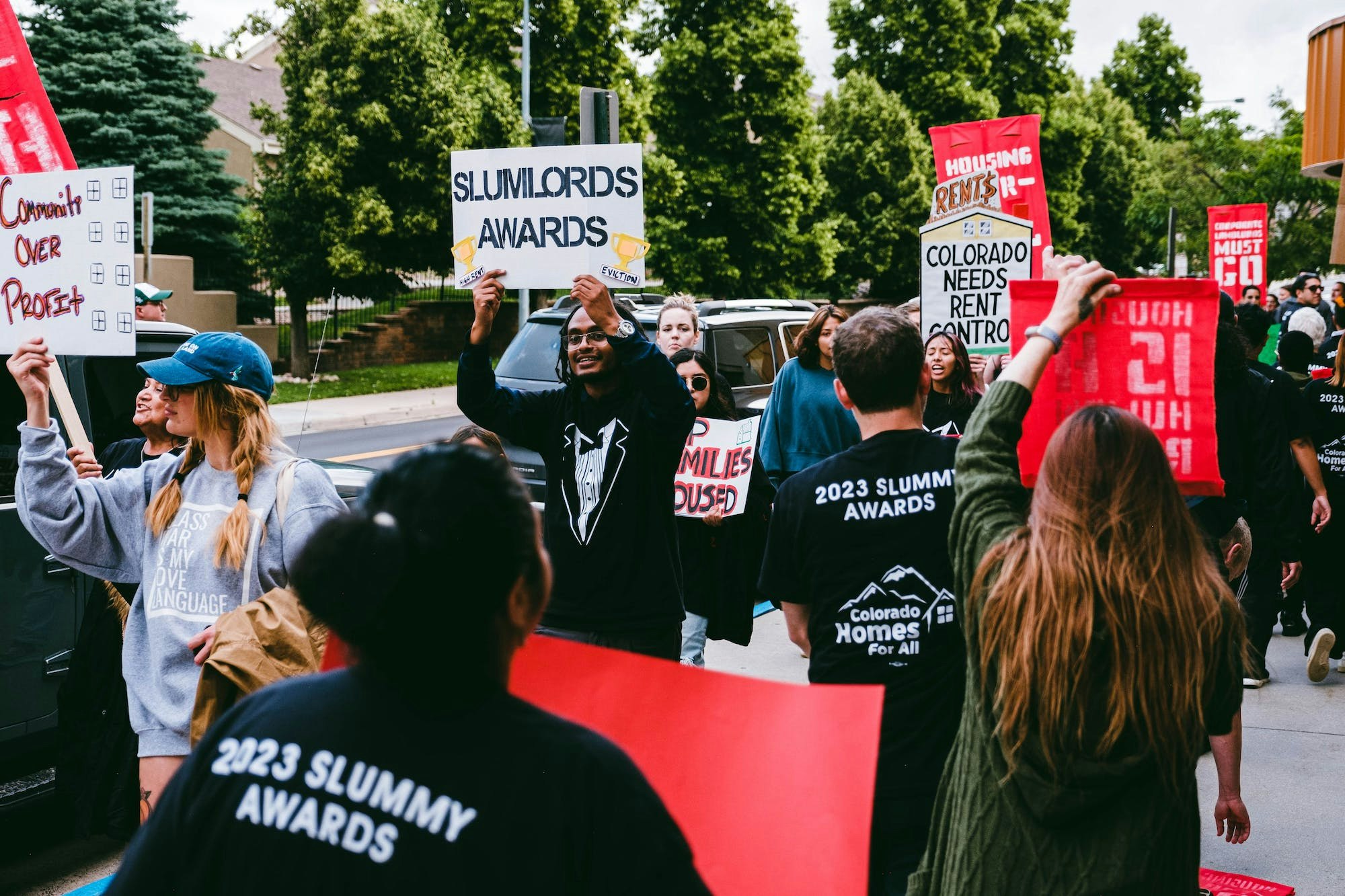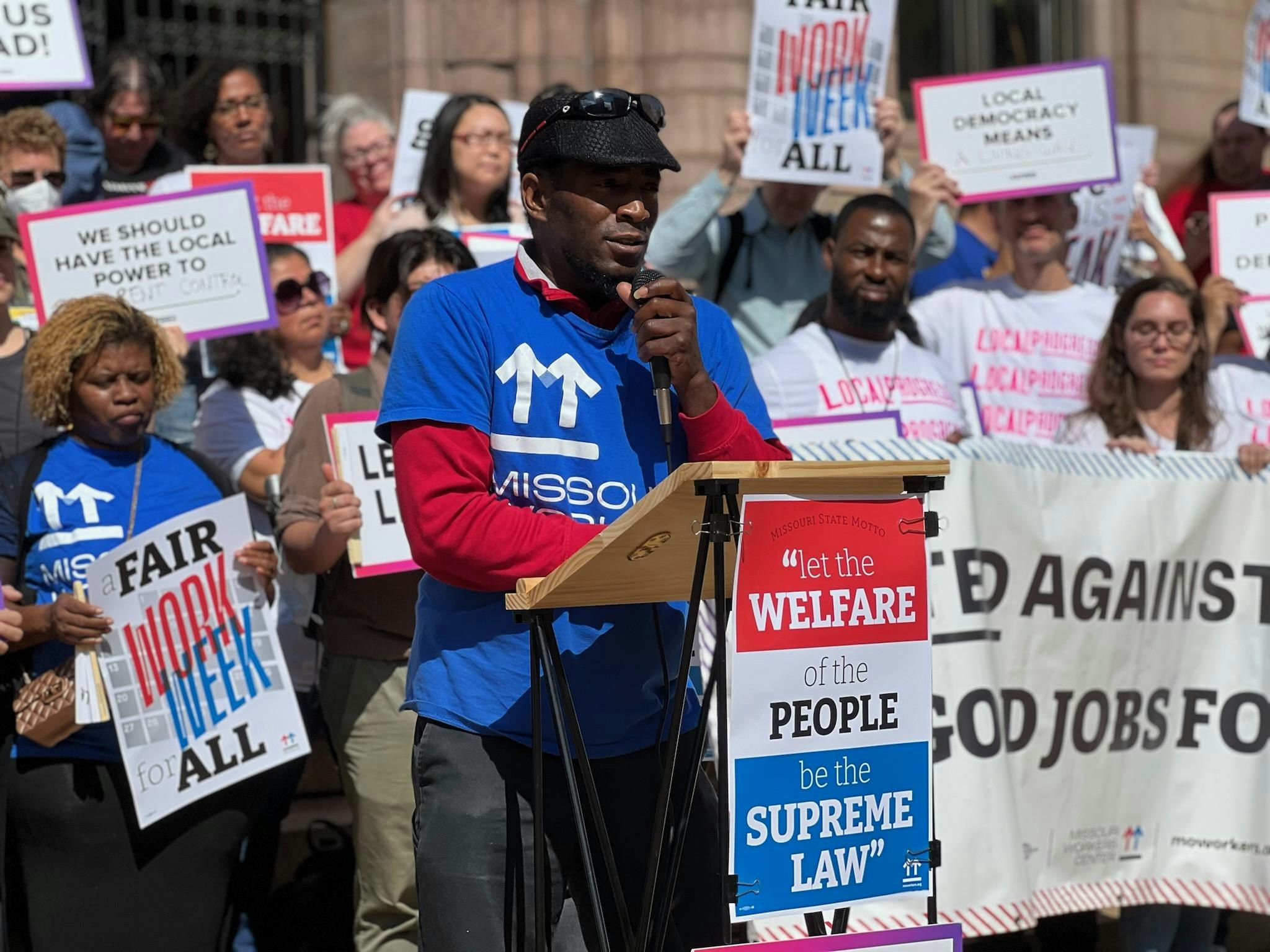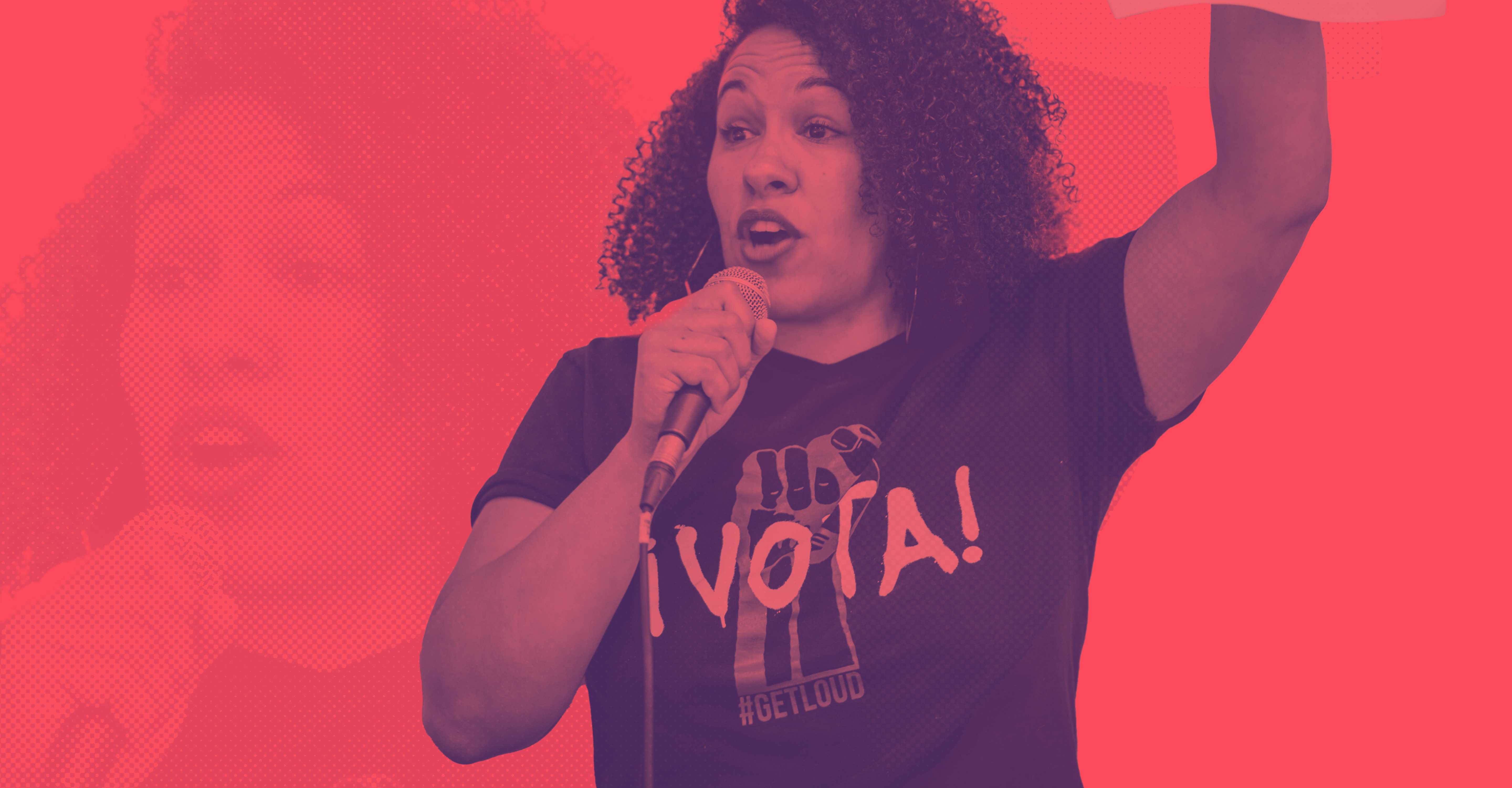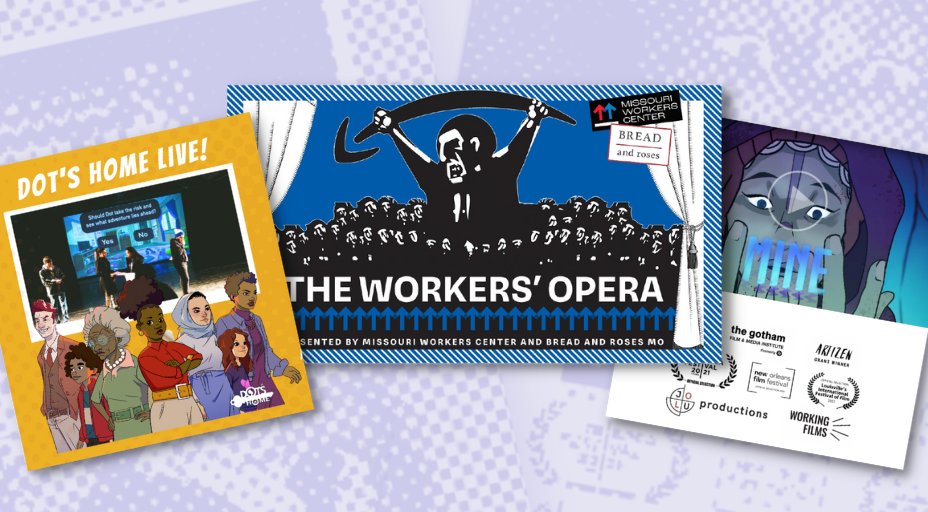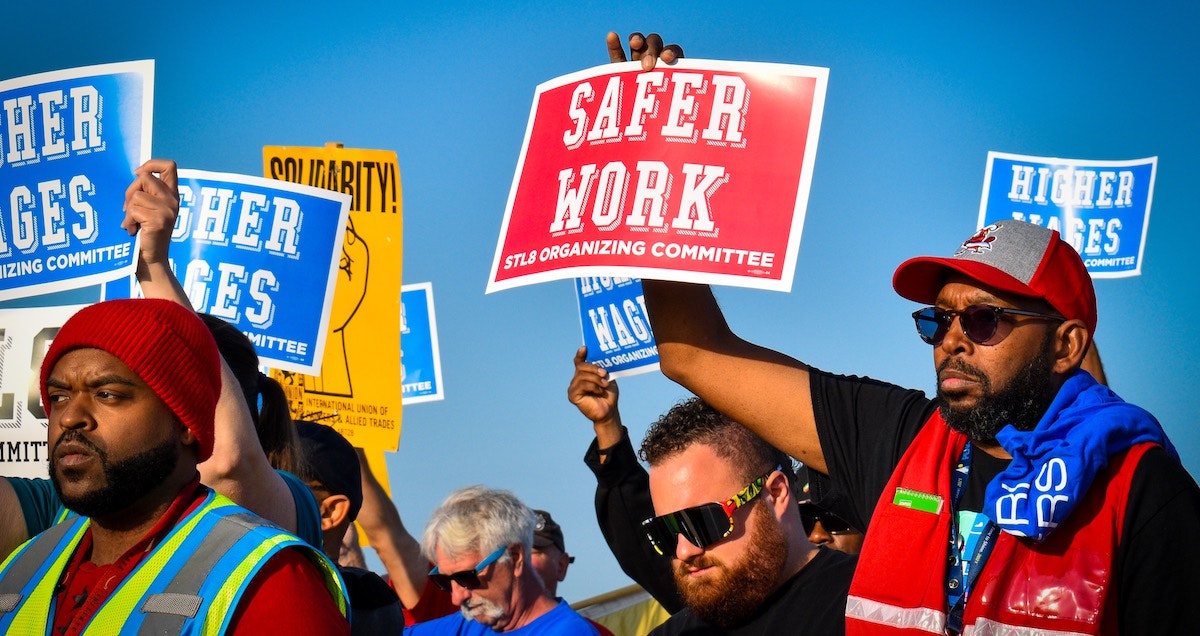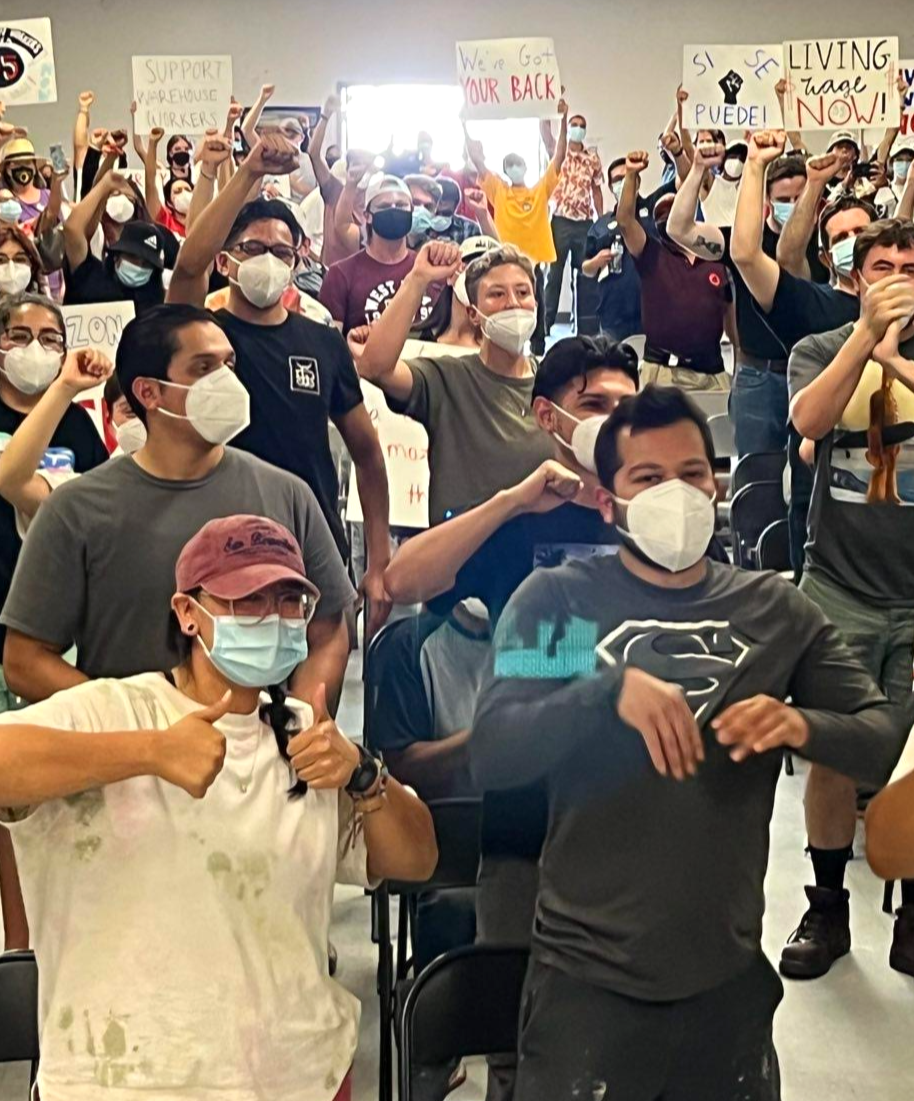By Jessie Vollmer, State Interference Campaign Director
Whether we live in big cities or small towns, commute to our jobs or work from home, most of us care about our neighbors and want our communities to thrive. But all over the country, corporations that want to exploit our families and neighbors for profit are pulling strings at the statehouse to block us from finding local solutions to the problems they cause in our neighborhoods.
Corporations have been pressuring state lawmakers to pass sweeping bans on local policymaking regarding things they don’t want to do – like pay living wages, provide reasonably priced housing, and do their business without polluting our homes. However, families, friends, and neighbors all over the country are coming together with their local leaders to expose the outsized power corporations have over their communities and fight for their freedom to take care of each other at the local level.
Fighting for the welfare of the people
This September, low-wage workers and residents from across Missouri joined progressive local elected officials to fight corporate-driven state bans on local policymaking. Together, they introduced a slew of new laws that they know can’t go into effect just yet, but will be ready to go the moment the Missouri legislature repeals current statewide bans. Our affiliate, Missouri Workers Center (MWC), has been working alongside Local Progress Impact Lab, a movement of local elected officials fighting for racial and economic justice, and other community organizations to raise the alarm about the many state bans driven by corporate interests in Missouri.
“Our state lawmakers have prioritized corporate welfare above the welfare of the people,” said Reverend Kevin D. Anthony, a local faith leader. “Instead of people governing corporations, wealthy corporations are effectively governing our communities. And that is not the Missouri way.” Missouri’s state motto, Salus populi suprema lex esto, translates to “Let the welfare of the people be the supreme law.” But when Missourians in St. Louis and Kansas City fought for and won higher minimum wages, corporations pressured state lawmakers into passing a statewide ban on local communities setting their own minimum wage standards.
But Missourians have not forgotten how greedy corporations took away their victory and stripped communities of their power to meet local needs. They’re exposing how corporations have been driving harmful state bans on local policies on everything from the ability to take breaks at work to capping skyrocketing rents. They’re rallying together and working with local elected officials to create and pass laws that will go into effect once state bans are repealed. At the September rally, Megan E. Green, President of the Board of Aldermen in St. Louis, introduced eight ordinances to fight corporate power, while calling on state lawmakers to truly listen to the needs of residents and community members. “The truth is they aren’t answering to us, they aren’t answering to the public,” explained Green. “They’re answering to major corporations, special interest groups, and wealthy donors who want to maximize their profits at the expense of democracy and working class people in our community. But in St. Louis we’re pushing back.”
Not just a Missouri problem
Missouri isn’t the only place where folks are fighting corporate-driven state bans on local policymaking. Our research has found corporate fingerprints on state bans all over the country. From Giant Foods holding down wages in Pennsylvania to Greystar Real Estate pushing rent control bans in Michigan and Colorado, corporations have been using their money and influence at the state level to extract from local communities while blocking those same communities from pushing back. Our affiliate, Stand Up Nashville, released a report earlier this year exposing Tennessee as one of the worst states for harmful corporate-driven state bans. Tennessee state lawmakers have been prioritizing corporate interests on everything from job safety to minimum wage and even reliable internet access at the expense of their communities – particularly the BIPOC and low-income folks most harmed by these bans.
And this problem is only getting worse. In recent years, there has been an uptick in corporate-driven state bans on local policymaking. States like Florida and Texas have recently passed sweeping legislation banning communities from setting their own standards and meeting their own needs on pretty much every important issue. Austin City Council member Zohaib “Zo” Qadri – who joined Missourians at their September rally – reflected that “there used to be a strong emphasis on local control in Texas,” but, “just as in Missouri and too many other states, Texas lawmakers beholden to corporate donors are overstepping and interfering with cities, counties, and other local jurisdictions.” Corporations are increasingly using their money and influence to push these bans, using them as a tool to continue extracting from our communities while stamping out local pushback.
This uptick has occurred when our communities most need the freedom to care for one another. In times of crisis – such as during the COVID-19 pandemic – local communities are blocked from getting what they need because corporations have already turned their state lawmakers against them. “These corporations, landlords, and property management companies that levy sky high rent costs that we pay, that file these evictions that we have to deal with, they have the ears of our state legislators,” shared Kennard Williams, a housing justice organizer with Action St Louis. “They work with them to limit what our local elected officials can do to manage this housing crisis and to save families. That ain’t right.”
How are corporations driving these bans?
What’s worse is that many people don’t even know corporations are behind these bans. Corporations hide behind their positions of power within statewide industry groups – like chambers of commerce, realtors associations, and restaurant associations – pouring money into lobbying and campaign donations that pressure state lawmakers into prioritizing corporate bottom lines. That way, when local communities decide to cap skyrocketing rents or demand work schedules with enough notice so they can secure childcare, corporations can rest easy. They know that state laws they helped advance will block local policymaking and protect their own interests.
By hiding behind industry groups and lobbyists, corporations can wield more power over our communities than our local elected leaders, all without hurting their public image (and therefore, their profits). For example, Giant Foods is part of the leadership of and a top contributor to the Pennsylvania Chamber of Business and Industry, which has consistently supported the state’s ban on local communities having any say over wages, scheduling, or sick leave.
Exposing corporate landlords in Colorado
In Colorado, our affiliate United for a New Economy (UNE) has been organizing tenants to put a stop to the greedy corporate landlords who have been fueling the rapid rise of housing costs. They’ve been buying up properties and jacking up rents so high that the number of Coloradans without homes has more than doubled since 2007.
Every time Colorado communities have tried to work with local leaders on policies that would stabilize rents, they have been faced with a state law that bans them from doing so. Recently, Coloradans fought to repeal a statewide ban on rent control, but corporation landlords like Greystar Real Estate used their resources to block that repeal and make sure they could continue to exploit Colorado renters without limit. Greystar and other corporate landlords are part of the leadership of the Colorado Apartment Association, which lobbied to make sure Colorado state lawmakers upheld the ban on local rent stabilization policies. But Coloradans aren’t backing down.
Earlier this year, renters with UNE and the Colorado Homes For All Coalition put a spotlight on the landlords, corporations, and lobbyists responsible for exploiting renters and families. While the Apartment Association of Metro Denver gathered landlords and board members for an evening of cocktails and awards, renters rallied outside and put on their own anti-award ceremony: The Slummys. They gave awards like “Worst Rent Hiker” and shared stories of untenable living conditions, harassment, utility shut-offs, skyrocketing rents, and unfair evictions. Renters know what their communities need and they know who stands in the way — they’re exposing the corporate landlords who hide behind apartment associations and lobbyists, and they’re fighting for a Colorado that prioritizes their community needs over corporate greed.
Taking back our democracy – together
State officials in the pockets of these corporations have been trying to distract us from the fact that they’re prioritizing the interests of corporations over their own people. They place the blame for things like skyrocketing rents and low wages on our own communities and leaders. They try to divide us based on where we live and what we look like, or pit us against one another rather than focus on the real culprits. But our communities are not that easily divided and distracted.
Terrence Wise, a leader with MWC, puts it best: “This legislation disproportionately impacts Black and Brown communities, but do white workers benefit from it? They do not. Our white brothers, sisters, and siblings suffer as well. That’s why it’s time for all of us to come together. Black, Brown, white, gay and straight, native-born, foreign-born, it doesn’t matter. We all gotta come together, or they’ll continue to try to divide and conquer us and keep us in poverty and without unions. We can do this, but there’s only one way we can do it, and that’s doing it together. Because together we will win.”
From Missouri to Colorado, Tennessee, and beyond, folks in states all across the country are rising up together to expose how corporations are hiding behind industry groups, lobbyists, and state lawmakers and blocking communities from taking care of each other. Everyday people are coming up with solutions to the problems caused by greedy corporations, while local elected leaders are starting to speak out against the state bans that make it impossible for them to work with their communities. “Our city is once again poised to fight for change,” affirmed St. Louis BOA President Green. To come together, speak up, expose the corporations engineering the policies hurting our communities, and fight for our freedom to take care of each other – in the words of folks who gathered together this past September and chanted in unison: “This is what democracy looks like.”
